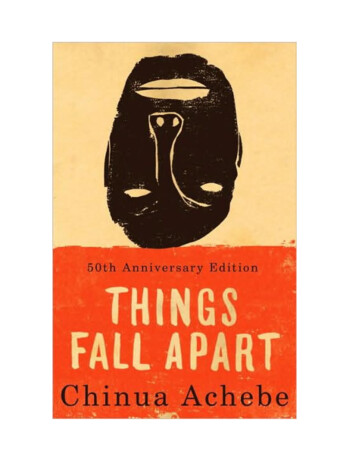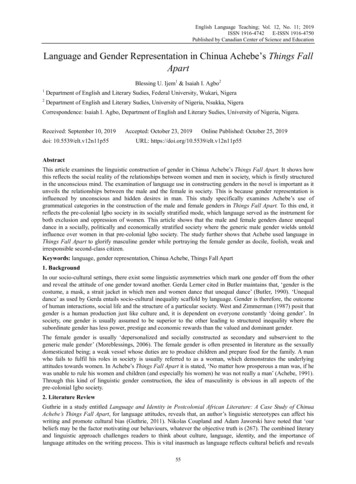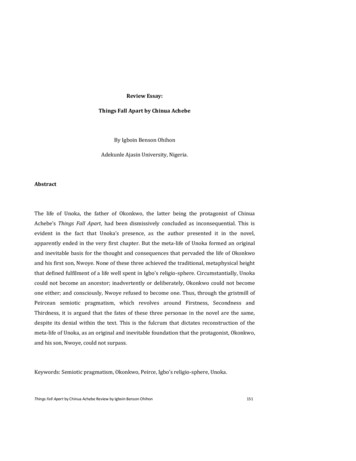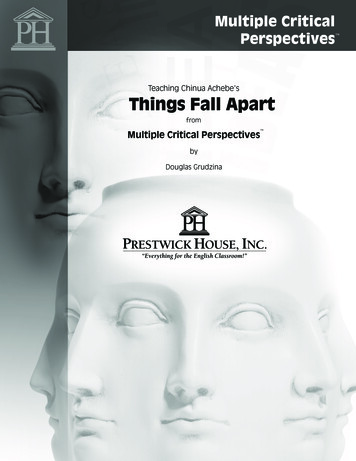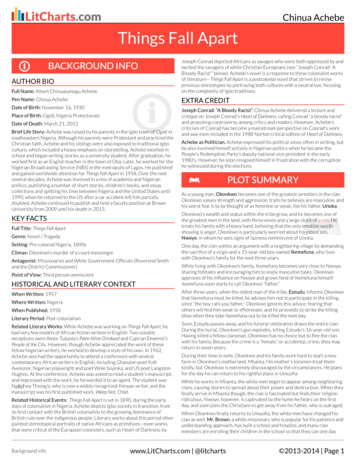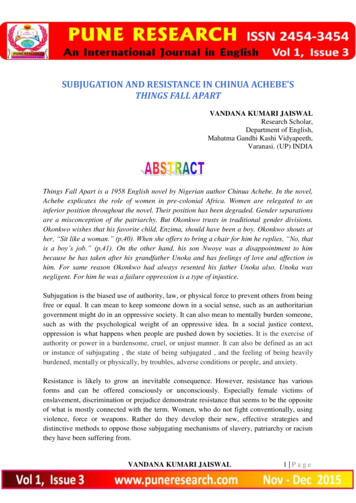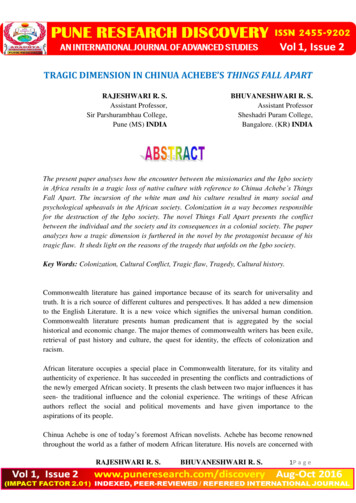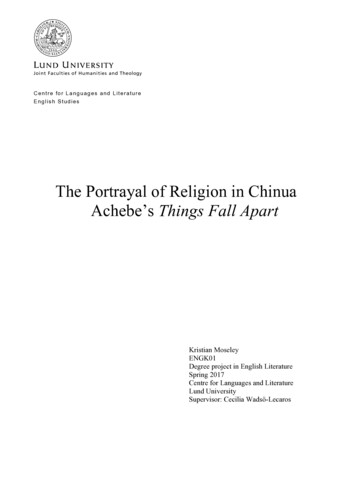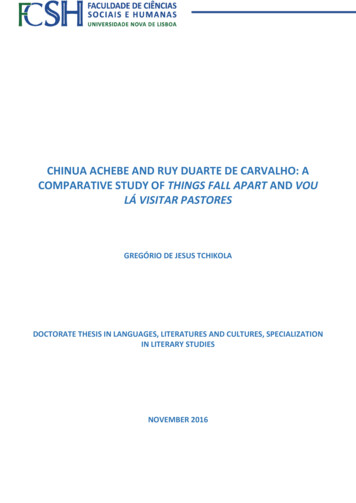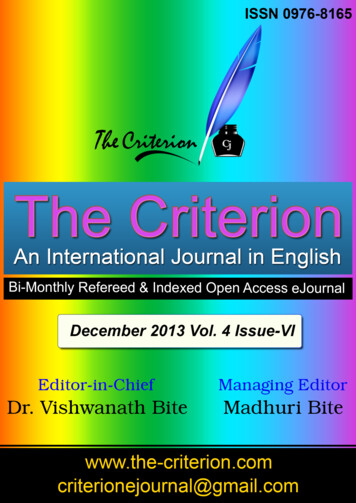
Transcription
American Research Journal of English and LiteratureVolume 7, Issue 1, 1-9 PagesResearch Article Open AccessISSN (Online)- 2378-9026DOI :Chinua Achebe’s Objective Stance in Depicting Socio-CulturalIssues of the Igbo in the Novel Things Fall ApartMd. Mahbubul AlamLecturer in English, Pabna Cadet College, Pabna, Bangladesh.AbstractIn Chinua Achebe’s magnum opus Things Fall Apart we see an authentic and objective presentation of the Igbo society. Theethnographic depiction of the Igbo life in the novel indicates that Achebe has tried to maintain his objective standpointin dealing with various socio-cultural issues of the Igbo society. He has depicted these issues from the perspective of bothan unbiased observer as well as an unprejudiced critic. The present study has shown to what extent and in which aspectshas Achebe maintained his objective stance in depicting the pre-colonial Ibo society in respect of various socio-culturalmechanisms in the novel. To do so, firstly, this paper has presented the socio-cultural aspects like social administration,justice, respect for the elders, social status, rituals, communal harmony and unity etc. of the Igbo people in their reallife already put forward by various researchers and anthropologists without considering the presence of their relatedcontents in Things Fall Apart. Then, these real issues and their parallel presence in the novel have been presented sideby side to see to what extent the scholars’ claims about various socio-cultural sides of the Igbo life are either agreed orrefuted in the novel. Finally, these issues are thoroughly dealt with to discuss Achebe’s objectivity. The results show thatthe scholars’ claim about the socio-cultural realities of the Igbo possesses close proximity with those of the novel. The coreidea of the findings is that Achebe maintains objectivity in presenting various socio-cultural sides of the pre-colonial Igbosociety in Things Fall Apart without spoiling any literary grandeur of the novel.Keywords: Chinua Achebe, Igbo people, Igbo society, objectivity, Things Fall Apart,IntroductionIt is rightly claimed that Chinua Achebe is the father ofmodern African literature (Aggarwal, 2013, p. 221). Manyscholars have presented their arguments in favour of theclaim. Such as, Gomba (2013) says, “The rise of Achebe hasbrought about the rise of many others, directly or indirectly”(p. 153). Ojaide (2013) states that Achebe’s writings havecontributed to “build a canon of modern African literature”(p. 150) and we see its true reflection in today’s writers.In his first novel Things Fall Apart the project Achebe adoptsexplains his position based on the interiority of original localcontexts. Achebe has declared that he wrote the novel “inorder to reassert African identity and as part of the growthof Nigerian nationalism” (O’Reilly, 2001, p. 61). Things FallApart has become the ambassadorial novel of the Africancontinent. It shows the disintegration occurred in theIgbo’s life once that was orderly, enriched and disciplined.In this respect, in his essay “Named for Victoria, Queen ofEngland”, Achebe (1995) expresses his moral responsibilityto reassert the past. He said that Things Fall Apart “was anwww.arjonline.orgact of atonement with my past, a ritual return and homage ofa prodigal son” (p. 103).In his essay “The African writer and the English Language”,Achebe argues that African literature should be defined ashaving “the complexities of the African scene” in materialtime, otherwise it is “doomed to failure” (1975, p. 75). Achebepresents to us an all-encompassing and meticulous depictionof the pre- colonial Igbo society in Things Fall Apart. Onemajor purpose of his writing the novel is writing back to theEuropeans or the colonizers who have long misrepresentedAfrica through their fabricated stories about Africa’s longpracticed traditions and cultures. Prof. Fakrul Alam (2011)shares the same opinion: “One of Chinua Achebe’s goals inwriting Things Fall Apart was to correct a whole history ofmisrepresentations of his people and country in occidentaldiscourse” (p. 5).Defining Objectivity in LiteratureThere is debate whether works of fiction claim to representthe truth. There is a long history of reflection within criticaltheory on the relationship between art and the real, external1
Chinua Achebe’s Objective Stance in Depicting Socio-Cultural Issues of the Igbo in the Novel Things Fall Apartworld which it claims to represent, reflect, mirror, describe,etc. Lukács (1970) in his essay “Art and Objective Truth” seeksto grasp how a given work may objectively reflect the socialtotality of a given place and time in the process of change.In the work of art, “any extract, any event, any individualor any aspect of the individual’s life must represent such acontext in its concreteness, thus in the unity of all its inherentdeterminants” (p. 47). These determinants must appear as“concrete, direct, perceptible qualities of individual men andsituations” (p. 48). According to Cuddon (2012), “Objectivitysuggests that the writer is ‘outside’ of and detached fromwhat he is writing about, has expelled himself from it, iswriting about other people rather than about himself”, andin this way the writer maintains ‘negative capability’ and‘aesthetic distance’ (p. 690).An objective or impersonal work is one in which the authorpresents the invented situation or the fictional characters andtheir thoughts, feelings, and actions and remains detached.An objective writer is free from bias in his writing. We canidentify writer’s bias. He makes assertions in his worksand informs or persuades readers to believe a particularperspective. Consequently, he not only chooses the contentof the work, he also chooses its tone. So, writer’s bias can befound in content. We can examine the information the writerincluded or excluded in the text. Writer’s bias can also befound in tone through an examination of the language usedin the text.The present study is now going to go through some majorsocio-cultural aspects depicted in the novel Things Fall Apartto analyze Achebe’s objective stance.Textual AnalysisGlorification of MasculinityAccording to Manus (2007, p. 255) and Nwoye (2011, p.313), the Igbo society is highly patriarchal. The Igbo childis brought up in his father’s lineage (Uchendu, 1965, p. 64).The father is an unquestioned authority in family; patriarchyand patrilineality form orders of authority and inheritance(Onyeozili & Ebbe, 2012, p. 37). Nwoye (2011) says thatwomen have no inheritance of land among the Igbo. In suchcases the woman’s male children inherit the land. In a word,masculinity controls the gender ideology amongst the Igbo.Kinship is primarily traced in the male line (p. 312).Osei-Nyame (2009) expresses the view that “Achebe’s textlinks and identifies power and authority with masculinity”(p. 4). We will study this report on the basis of Things FallApart. Okonkwo is the most prominent masculinist figurewho appreciates Nwoye, his young son, when the later “wouldfeign annoyance and grumble aloud about women and theirtroubles”. He wants him to be like himself. He is always happywhen he hears him grumbling about women. That shows thatin time he will be able to control his women-folk. Okonkwobelieves that a man may be prosperous but if he is unableto rule his women and his children, he is not really a man.www.arjonline.orgHe also encourages the boys to sit with him in his obi andtells ‘masculine stories of violence and bloodshed’. Okonkwowants Nwoye “to grow into a tough young man capable ofruling his father’s household when he was dead and gone tojoin the ancestors” (p.37).In line with this, Jua (2009) claims that Things Fall Apartis a quintessential ‘man’ novel (p. 199) and “It is the man,Okonkwo, who is privileged” (p. 201). This type of criticismof the text actually goes against Achebe who does not depictthis masculinist picture intentionally. This is just a projectionof social reality, not the reality created in the text.Individual Achievement and StatusPersonal achievement was mostly valued among the Igbo(Ohadike, 1996, p. xxvi). Igbo socialization processes arematerialized on solid personal achievement. Assertingmuch importance to “individual achievement may accountfor the fact that the Igbo have been remarkably successfulin a variety of professions” (Booker, 2003, p.110). Onyeozili& Ebbe (2012) state that the people of Igboland “respectedand honored achieved status more than ascribed status.Individual achievements determine a person’s social positionin his community. Consequently, alcoholism and loitering arenot characteristics of the Igbo. They are very assertive andproud of their achievements, and they raise their childrennot to fail in life” (p. 31). The Igbo also value improving theirstatus. They attach importance on individual social status.There is an Igbo proverb- “No one knows the womb thatbears the chief” (Uchendu, 1965, p. 20, cited in Stevenson,1985, p. 14). The social status involves having a large progeny,wealth, effective leadership and generosity in helping otherpersons (Stevenson, 1985, p. 14).The value of personal achievements is elaborately shown inThings Fall Apart. The protagonist, Okonkwo has no patiencewith unsuccessful men having no personal achievements.Okonkwo’s “fame was rested on solid personal achievements”(p.3). There are frequent uses of the word ‘failure’ besidethe name of Unoka, father of Okonkwo. Sometimes, Unoka’sfailure is contrasted to the success of other characters likeOkonkwo and Okoye. Unoka is unsuccessful, has no acquiredtitle, strength of arms, worldly determination and thesocially ascribed manly qualities. Okonkwo is ashamed ofhis father having no manly achievements. “People laughed athim (Unoka) because he was a loafer” (p.4).But Okonkwo is fortunate because “among these people aman was judged according to his worth and not accordingto the worth of his father.” Okonkwo is the greatest wrestlerin the nine villages. He is a wealthy farmer and has twobarns full of yams, and has just married his third wife. Hemanifests great heroism in two inter-tribal wars. So, althoughOkonkwo is still young, he is already one of the greatest menof his time. (p.6) Age is respected among Okonkwo’s people,but achievement is ‘revered’. There is a proverb that if a childwashes his hands he can eat with kings. Okonkwo has clearly2
Chinua Achebe’s Objective Stance in Depicting Socio-Cultural Issues of the Igbo in the Novel Things Fall Apartwashed his hands and so he eats with kings and elders (p.6).So, Owoyemi (2012) rightly observes that Okonkwo “startedfrom scratch to become one of the leaders of his clan, throughpersonal efforts” (p.177).TitleThe Igbo value titles. One of the personal achievements tothe Igbo is acquiring titles. A titled man is a prestigious andpowerful man in the clan. A man without title is called Agbalaor ‘women’ and is buried ‘without dignity’ (Ohadike, 1996, p.xxvi). The highest title is Ozo (Ohadike, 1996, p. xxvi) and thistitle is the most prestigious (Nwoye, 2011, p. 306). Expensiveinitiation fees, elaborate feasting and dancing are requiredwhile taking the higher titles. To qualify for the highest titlea man must also have acquired the junior titles and enoughwealth. An Ozo man is no longer an ordinary man, but a god.(Ohadike, 1996, p. xxvi). The titleholders within the higherranks enjoy some praise names such as, Ogbuefi (cow killer),Ogbuanyinya (horse killer), Ide (the piller) and Nze or chief.The signs of the titles include ankle cords tied on feet (owaozo), an iron staff (olo) and a cow or horsetail (nza) etc.(Nwoye, 2011, p. 306).In Things Fall Apart the dignity of the title- holders issignificant. Okoye is going to take the Idemili title, the thirdhighest in the land (p. 5). Nwakibie has the highest title inthe clan (p. 14). In the forest on the way to the place whereIkemefuna will be murdered the men heard the cheering anddrum- beating of a title- giving ceremony in a nearby tribe.Ezeudu possesses three titles which “was a rare achievement.There were only four titles in the clan, and only one or twomen in any generation ever achieved the fourth and highest.When they did, they became the lords of the land”. (P. 87)Ogbuefi is a title-holder’s praise name that is found in thenovel when Ndulue, once who was a great man and hero,is mentioned after his death. He is called ‘Ogbuefi Ndulue’by the people. When he is no more his wife goes to his obiand calls by his name ‘Ogbuefi Ndulue’ three times. ‘Ogbuefi’before the name ‘Ndulue’ suggests that he is a great titleholder, and was a strong man in his youth. We see the sign oftitle of Nwakibie carried by his first wife Anasi who wears theanklet of her husband’s titles (14). There is Ogbuefi Ezeugowho is a powerful orator (8). There is Ogbuefi Udo whosewife is murdered by some men of the neighboring villageMbaino (ibid).The Igbo expect and value the life that is full of achievementsand glory. Acquiring titles is one of the achievements thatthe Igbo crave for. Craving for acquiring titles signifies a lotin Things Fall Apart. Through the description of the value oftitles Achebe tries to show how ambitious and worldly theIgbo are. The psychology of a title-holder can be understoodby the reader in the description. Throughout the text, we caneasily distinguish a contrastive picture of the psychology andlife of a title-holder and a non-title-holder, e.g., Unoka andwww.arjonline.orgOkonkwo, or Unoka and Okoye. Achebe makes the contrastin order to convey the importance of titles to the Igbo.Obi and Ofo: Symbols of Achievement, Authorityand LeadershipThe Igbo have the practice of architectural symbol ofauthority. Human-made structure, like the obi, indicatestheir notions of authority. The obi represents social, political,and economic principles and is seen as a social ideology ofachievement and leadership. It is located at the centre ofthe family compound. Nwoye (2011) notes that the obi isthe connecting point between the family space and externalspace- the inner familial reality and external social reality and“The central location of the Obi (Obu) in the family compoundapproximates in its structure Igbo notions of achievementand leadership” (p. 311). In the words of Ohadike (1996, p.XXIII), the most important lineage and house meetings wereheld in the obi of the most senior elders.In Things Fall Apart we get significant reference to the obis ofOkonkwo, Obirieka, Nwakibie and Uchendu. Each of the obissignifies distinct authority and possession of its owner. Thenarrator describes Okonkwo’s obi-Okonkwo’s prosperity was visible in his household. He hada large compound enclosed by a thick wall of red earth. Hisown hut, or obi, stood immediately behind the only gate inthe red walls. Each of his three wives had her own hut, whichtogether formed a half moon behind the obi. (p.10)In Mbanta Okonkwo with the help of his mother’s kinsmenbuilds himself an obi and three huts for his wives (p.91).When Oknokwo with a pot of palm-wine and a cock goesto Nwakaibie to borrow seed-yams, he meets him in his obi(p.14). Whenever Okonkwo meets Obierika in the latter’shouse his obi is the common place. The repeated use of obi inthe novel suggests that it attempts to unfold a reality of allpervasive masculine ideology of Igbo society.Ofo is one of the ritual symbols of authority among the Igbo.It is, to the Igbo, the supreme ancestral symbol, the staff oftraditional influence. It is also the symbol of justice and truth.The oldest person of the lineage or family holds the Ofo. Itis handed down from generation to generation (Nwoye,2011, p.315). An Ofo is obtained from the twig of the ofo tree(Nwagbara, 2011, p. 143).Things Fall Apart has a very little reference to Ofo. Only oncethroughout the whole text the reference to Ofo occurs and itis when Uchendu, Oknokwo’s maternal uncle and the oldestmember in his surrounding, sits together with his familymembers at the occasion of his son’s marriage. The narratordescribes the situationThey sat in a big circle on the ground and the bride sat in thecentre . Uchendu sat by her, holding the ancestral staff [ofo]of the family. (P. 93)3
Chinua Achebe’s Objective Stance in Depicting Socio-Cultural Issues of the Igbo in the Novel Things Fall ApartNo King, Police or Modern AdministrationChowdhury (2012) in a book about African myths states,“The extent of belief surpasses the material world to themetaphysical world- the integration of which makes socialharmony in African rural life possible where there is no scopefor any centralized authority” (p.21) (My translation fromBangla). In Igboland too there is no scope for any centralizedauthority. Igbo society lacks the centralized political structure(Ohadike, 1996, p. XXII; Nwoye, 2011, p.305). The Igbo havebeen described as The King in Every Man (Henderson, citedin Onyeozili and Ebbe, 2012, p.30) which means that the Igbohave no kingship system. Though they have no centralizedgovernment or king with power, they abide by laws beforethe coming of European influence (p.38). Onyeozili & Ebbe(2012) argue that in Igboland “social control was informalbut efficient. There was no formalized police system inmodern sense of the words” (p.35). Majumder (2007) refersto Ram Nath, an Indian tourist and writer who had practicalexperiences about African societies and says, “Ram Nath didnot see any police in the villages, nor did he feel its necessity”(“Ouponibeshik Bonam” (p.139).The world of Things of Apart is a world of no king or centralpower. The missionaries ask the villagers who the king of thevillagers is. But the villagers tell them that there is no king.They say to the missionaries, “We have men of high title andthe chief priests and the elders” (p.105). Majumder (2007)refers to Tyler, an anthropologist, whose writing is thoughtto be objective. Tyler writes-The tourists, after reaching the impassable countries [inAfrica] and seeing no police system available in their owncountries, come to the direct conclusion that the cannibalslive there as their wishes. We think it is a wrong belief,because, in these ‘uncivilized’ countries there are severerules and regulations in each stapes of life. (“OuponibeshikBonam”, p. 137) (My translation from Bangla)One noteworthy point is that though there is no king inIgboland, the Igbo people are not completely ignorant of theconcept of kingship. They may have no first- hand experiencesof kingship but they have idea about the grandeur of kingship.Things Fall Apart mentions a proverb that is related to king“If a child washed his hands he could eat with kings” (p.6).This proverb tells us that the Igbo are well aware of theheight and honor of a king.Similarly, Things Fall Apart deals with a society where peoplelive by abiding by traditional laws, rules and regulations. Itis not that the society depicted in it is free from vices andcrimes. There are evil doers as well as punishment ascribedby socio- cultural rules. That is why there is no need for thepolice system or other formal tools for social security. Thissystem prevails until European colonialism comes.Restorative JusticeJustice in Igboland conforms to restorative justice.www.arjonline.orgRestorative justice, according to Mediation UK, is “a processwhereby victims, offenders, and communities are collectivelyinvolved in resolving how to deal with the aftermath of anoffence and its implications for the future” (cited in Omale,2006, p.36). According to Merry, the main task of traditionaldispute settlement in Africa is to ‘restore social harmony’and ‘reconcile the parties’. So, the penalties generally focuson compensation or restitution in order to restore thestatus quo, rather than punishment. (Cited in Omale, 2006,p.45) Elechi (cited in Omale, 2006, p. 37) reviews widelythe restorative traditions of dispute resolution amongst theIgbos. Onyeozili & Ebbe (2012), for example, say about theoffender who has to accept exileIn cases of abominable hateful offenses like murder, anoffender and his family may be permanently expelled from thecommunity. If the offense is manslaughter- an unintentionalmurder, the resultant penalty would differ. The guilty personand all his family are required to go on exile for a givennumber of years after which they would be reconciled withthe community. (p.37)But, homicide is strictly forbidden to the Igbo. “Spillingthe blood of a townsman or townswomen was a seriousoffence against the earth goddess If a murder occurred inprecolonial times, certain age-groups might seize the propertyof the murderer and destroy his house” (Ohadike, 1996, p.XXXVII). In the funeral ceremony of Ezeudu, Okonkwo’s gunexplodes and the dead man’s sixteen year old boy is killed. Itis an unintended killing. But Okonkwo is not out of danger.He has to accept punishment and he does so.The only course open to Okonkwo was to flee from the clan. Itwas a crime against the earth goddess to kill a clansman, anda man who committed it must flee from the land. The crimewas of two kinds, male and female. Okonkwo had committedthe female, because it had been inadvertent. He could returnto the clan after seven years. (P.88)The justice delivered on Okonkwo’s case is restorative innature. The punishment does not destroy Okonkwo’s life.Only he has to renew the life after leaving his original landfor seven years. The justice gives chance to him for hisregeneration in Mbanta. A cow has been let loose during theUri ceremony of Obierika’s daughter. The cow is driven backto the owner “who at once paid the heavy fine which thevillage imposed on anyone whose cow was let loose on hisneighbor’s crops” (p. 81). This event shows how law- abidingthe Igbo are. Justice is done when the cow is given back tothe owner. The incident too indicates restorative justice inIgboland.One significant thing is that we do not see any prison or asylumin the Igbo society depicted in Things Fall Apart, as we see inthe modern world. Nor do we see any trace of Panopticon(my italic). The Panopticon is a type of institutional buildingdesigned in the late 18th century. It allows a single watchmanto observe (-opticon) all (pan-) inmates of an institution4
Chinua Achebe’s Objective Stance in Depicting Socio-Cultural Issues of the Igbo in the Novel Things Fall Apartwithout the inmates being able to tell whether or not theyare being watched. According to Foucault, “the Panopticonis an architectural design or plan that signals a convergenceof a historically situated political and social ideology, a sociomaterial epistemology, and a pragmatics of social controland resistance. In its most concrete form, the Panopticon isa socio-material template for institutional orders of all kindsranging from prisons, to schools, to factories, to hospitals.”(Simon, 2005, p.2) In the Igbo society there is no system ofprison, the existence of the Panopticon is beyond question.Rather, it is by the Western colonial authority, representedby the District Commissioner, the system of prison andsurveillance is introduced. At the end of the novel, Okonkwoand the leaders of Umuofia are tortured by the Colonialadministration. This type of torture is quite unknown to thepeople of Umuofia.Decision MakingIn traditional or non-literate societies there are attempts totake public decision and dialogue and try to avoid war. Udefi(2012) observes that, in the time of an impending war peoplerise up to look for solutions and strategies to either avoid orprosecute the war. The decision is arrived at through ‘criticaldialogue’ (p.62). Ezenweke et al (2013) agree with Udefi andopine that the African concept of democracy contained in herphilosophy of republicanism is deeply rooted, for example, inIgbo life and thought. Before taking any decision the peoplehave the tradition of gathering together to discuss matters inorder to arrive at an agreement (p.66).Things Fall Apart witnesses that Umuofia “never went to warunless its case was clear and just and was accepted as suchby its Oracle- the Oracle of the Hills and the Caves”. In somecertain occasions the Oracle forbids them to enter into war(p.9). When a woman of Umuofia is killed by some men ofthe neighboring village Mbaino, the people do not take anydecision of attacking that village. They offer options- “at theend it was decided to follow the normal course of action. Anultimatum was immediately dispatched to Mbaino askingthem to choose between war on the one hand, and on theother, the offer of a young man and a virgin as compensation.”(P.8)When three converts kill the sacred python the people ofMbanta decide to keep patience, though the killing of thesacred python is similar to the killing of god. In the meetingit is said-It is not our custom to fight for our gods let us not presumeto do so now. If a man kills the sacred python in the secrecyof his hut, the matter lies between him and the god. We didnot see it. If we put ourselves between the god and his victimwe may receive blows intended for the offender, when a manblasphemes, what do we do? Do we go and stop his mouth?No. We put our fingers into our ears to stop us hearing. Thatis a wise action. (P.113).Everybody in the assembly speaks. In the end it is decidedwww.arjonline.orgthat the Christians must be ostracized. These two eventsare enough to show that the Igbo always try to avoid war.Whatever they want to do for their community purpose theydo it through public decision. There is no decision that is notrepresentative of the whole clan.Secret SocietyThere are secret societies in Igboland who work formaintaining peace and order if the individuals themselves areincapable of doing so. Some secret societies are exclusivelyfor men, some for women, and others for the both. Themembers of this society took their ‘oath of secrecy’ that iswhy very little was known about it. They are called egwugwuand use masks in the judicial process. According to Achebe(1975), the masked spirits are “representative visitors” fromthe underworld (p.134). They are “the mouthpieces of theancestors, oracles, and spirits”. The egwugwu as maskedancestors appear in important legal matters and pronouncethe verdict. No one can deny their judgment, because no oneis wiser than the ancestors. No one discloses the identityof the man behind the mask, even if he happens to identifythe voice or the walk of a particular familiar man. (Ohadike,1996, p. XXX)In Things Fall Apart each of the nine villages of the clan hasa representative egwugwu whose leader is called Evil Forest(p.66). The egwugwu house faces the forest. People can seeonly its back. Even the women who decorate the egwugwuhouse never see the inside of it. If they imagine what is inside,they keep their imagination to themselves (p.63). Okonkworepresents his village in the committee of egwugwu. About anevent of solving judicial matters where Okonkwo is presentamong the egwugwu the narrator describesOkonkwo’s wives, and perhaps other women as well, mighthave noticed that the second egwugwu had the springy walkof Okonkwo. And they might also have noticed that Okonkwowas not among the titled men and elders who sat behind therow of egwugwu. But if they thought these things they keptthem within themselves. The egwugwu with the springy walkwas one of the dead fathers of the clan. (P. 64)This description indicates that the identity of the membersof the egwugwu is kept secret. The judicial meeting is aboutseveral problems. Among them is the dispute betweenUzowulu and his wife. In this trial process Evil Forest, thechief egwugwu, says,We have heard both sides of the case. Our duty is not to blamethis man or to praise that, but to settle the disputes. (P.60)This indicates the validity and reliability of the judgmentdelivered by the egwugwu. Evil Forest orders UzowuluGo to your in- laws with a pot of wine and beg your wifeto return to you. It is not bravery when a man fights with awoman.Then he orders Odukwe, the brother of Ezowulu’s wife- “Ifyour in-law brings wine to you, let your sister go with him”.5
Chinua Achebe’s Objective Stance in Depicting Socio-Cultural Issues of the Igbo in the Novel Things Fall ApartAgain, the judgment of the egwugwu clearly reflects the factthat Igbo judgment is restorative; it is constructive, ratherthan destructive. The egwugwu could have separated thefamily to solve the conjugal problem permanently. Instead,by delivering restorative verdict they try to establish reunionbetween the husband and the wife.Respect for EldersThe Igbo respect their elders. They say that he who listensto an elder is like one who consults an oracle and they areteacher and director of the young (Ezenweke & Nwadialor,2013, p. 67). Young people follow the elders for both of thematerial and the immaterial worlds.Okonkwo calls Nwakibie, who helps him by giving eighthundred seed yams, ‘Our father’. He says to him, “As ourpeople say, a man who pays respect to the great paves the wayfor his own greatness” (p.14). Even seniority is maintainedamong the departed ancestors. In the egwugwu meeting EvilForest is the leader. At the beginning of the trial process theegwugwu take their respective seats. The Evil Forest “tookthe first of the empty tools and the eight other egwugwubegan to sit in order of seniority after him” (p.63).Organic SocietyIn an organic society all of its structures work together ina balanced way. Igbo society is an organic one since itscomponent parts are balanced and work in a complex webof actions. Duarte referring to Diana Akers Rhoads (cited inBandyopadhay, 2012) notes that Igbo society “achieved whatmost people today search: democracy, tolerance, balanceof male and female principles, adaptability to changingcircumstances, redistribution of wealth, effective systems ofmorality and justice, and memorable poetry and art”.Chinua Achebe’s Things Fall Apart is an excellent model ofportraying a balanced society. The society presented inthe novel is coherent in its structure. It has a peculiar anddistinct identity with which its members a
Chinua Achebe’s Objective Stance in Depicting Socio-Cultural Issues of the Igbo in the Novel Things Fall Apart Md. Mahbubul Alam Lecturer in English, Pabna Cadet College, Pabna, Bangladesh. abstract In Chinua Achebe’s magnum opus Things Fall Apart we see an auth
